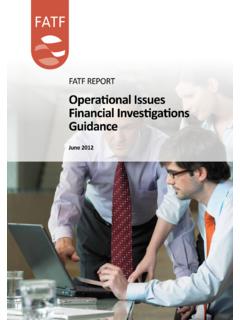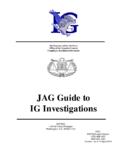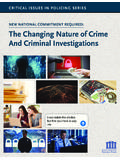Transcription of An Introduction to Securities Investigations in …
1 An Introduction to Securities Investigations in Ontario By: David Sischy 2 An Introduction to Securities Investigations in Ontario By: David Sischy Introduction This article provides an overview of some significant features of Securities Investigations in Canada, and more specifically in Ontario. The discussion focuses on three topics: Investigations initiated by the Ontario Securities Commission (the OSC ) under the powers conferred upon it by the Ontario Securities Act1 (the OSA ); Investigations carried out by Integrated Market Enforcement Teams (IMETs) which have been introduced by the federal government as a response to criminal offences in the capital markets; and, the role of special committees in responding to corporate wrongdoings and protecting directors against liability.
2 Investigations under the Ontario Securities Act Section 11 of the OSA equips the OSC with a powerful investigative tool. Under section 11, the OSC may order an investigation : a) for the due administration of Ontario Securities law or the regulation of the capital markets in Ontario; or b) to assist in the due administration of the Securities laws or the regulation of the capital markets in another jurisdiction. Pursuant to a section 11 order, one or more persons may be appointed to conduct the investigation and the matter to be investigated must be set out. Section 13 of the OSA provides the investigator(s) with broad powers in conducting their investigation including the power to compel testimony, enter business premises, and inspect and seize documents upon application to a judge.
3 A person or company compelled to testify may be represented by counsel, may claim any privilege to which the person or company is entitled, and any such testimony may not be 1 1990, c. 3 admitted in evidence against the person from whom the testimony was obtained in a prosecution under the OSA or any other proceeding governed by the Provincial Offences Section 16 of the OSA provides further statutory protections restricting the disclosure of information relating to the investigation , including any information obtained under a section 13 order compelling testimony. Generally, the disclosure of the existence and nature of an investigation either by OSC staff or the issuer itself is prohibited.
4 In the OSC Staff Notice 15-703 Guidelines for Staff Disclosure of Investigations , five general circumstances, or exceptions to the general policy of non-disclosure, are provided for that lead to compelled disclosure of the existence of an investigation . While such exceptions ostensibly exist for the protection of the investing public and maintaining confidence in the public markets, they have been criticized for contributing to potential prejudice to those under investigation if no proceedings are ultimately taken. In addition to these exceptions, issuers must continue to conform to disclosure obligations under Securities law and exchange requirements and therefore, disclosure may be necessary if the issuer determines that the fact of an investigation is a material fact or material change.
5 The person or company that is the subject of the investigation does not have any right to participate in the process of the investigation . The Supreme Court of Canada, in British Columbia Securities Commission v. Branch3 stated: Although those conducting an investigation are always under a duty to act fairly, this court has held that fairness in the context of such hearings does not require that the persons who are the subjects of the investigation participate in the examination of other witnesses, or that they be provided with an opportunity to adduce evidence or make submissions to the investigator. The rights of persons or companies who are the subjects of government Investigations are further limited in the context of informal Investigations .
6 In Barry v. Alberta ( Securities Commission)4, the Supreme Court of Canada determined that the Alberta Securities 2 1990, c. 3 [1995] 2 3, 1995 CarswellBC 171 at para. 83. 4 [1989] 1 301. 4 Commission has an implied authority to conduct informal Investigations without the formality of issuing an investigative order. The Court reasoned that requiring the Commission to issue an order before commencing an investigation may stifle necessary fact-finding activities and paralyze the operations of the Commission. As these informal Investigations do not carry with them the same procedural safeguards that attach to formal Investigations , they have been heavily criticized by the legal community.
7 Compounding this criticism is the OSC s Credit for Cooperation policy5 which is intended to encourage self-reporting behaviour and allow market participants to benefit, in the form of more favourable consequences for potential violations, from cooperating with OSC Staff during an investigation . Critics suggest that such a policy is coercive in nature given the possible repercussions of a refusal to cooperate. Possible repercussions of non-cooperation include a loss of status under the OSA and the removal of available exemptions. In considering whether to cooperate, a person or company must be aware of the numerous disadvantages such cooperation may entail, including the absence of procedural safeguards relating to confidentiality and self-incrimination, as well as the uncertainty that cooperation will lead to a more favourable outcome.
8 Integrated Market Enforcement Teams The federal government of Canada created Integrated Market Enforcement Teams (IMETs) to investigate, prosecute and deter major capital markets fraud and other market-related crimes that constitute offences under the Criminal Code of Canada. IMETs are RCMP (federal police) led units that may include a combination of other federal enforcement agencies, Securities regulators, law enforcement agencies of local jurisdiction, forensic accountants and other investigative experts. IMETs only target offences of regional or national significance and generally involve actions by publicly-traded companies with enough market clout to potentially pose a threat to investor confidence in Canada s capital markets.
9 The OSC will refer cases they believe are substantially criminal in nature to IMETs and will share investigative resources and expertise. 5 OSC Staff Notice 15-702 Credit for Cooperation. 5 For those who are the subject of an IMET investigation in Ontario, it should be noted that OSC investigators are prohibited from disclosing compelled testimony that was compelled pursuant to subsection 17(7) of the OSA to law enforcement officials without the consent of the person from whom the testimony was compelled. However, there are no such restrictions on passing information that is voluntarily provided. The subject of an IMET investigation should also be aware of their rights under the Canadian Charter of Rights and Freedoms.
10 While it is beyond the scope of this paper to explore the full range of Charter rights that might be engaged in an IMET or OSC investigation , it is important to note the Supreme Court of Canada s ruling in R. v. Jarvis6 that when the predominant purpose of a question or inquiry is the determination of penal liability, the full panoply of Charter rights are engaged. The Role of Special Committees The appointment of an independent special committee to pursue corporate wrongdoings exists as an effective option to rectify and ameliorate stakeholder harm. A special committee is normally established by a resolution of the board of directors and that resolution should set out the committee s mandate and scope of authority.






